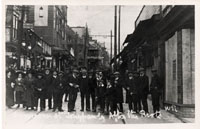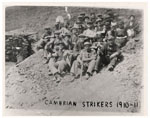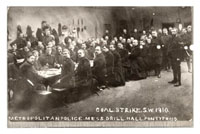 |
| You are here: Cwm > Themes > Events > : TonyPandy 1910 | |
 | |
|
Tonypandy 1910 |
|
|
|
|
|
The main reason for the miners’ disputes of 1910-11 was the change in the wage system that owners were trying to introduce. Wages were linked to the amount of coal produced, but if the men were working with difficult coal, then the colliery company made up their wage with an allowance. The owners were however, worried about high wages, and so they began to refuse to pay allowances.
In October 1910, there was a dispute at Cambrian Combine as some men refused to accept the new lower pay offer. 800 men were locked out and in November 1910, 12 000 miners went on strike. Violence broke out as the strikers stopped others miners going to work, and bitterness led to riots in Tonypandy. There was fighting between miners and the police, and most shops in Tonypandy had their windows broken. One miner died after a blow to the head thought to be from a police truncheon.
When the rioting had ended, the Home Secretary, Winston Churchill, sent troops into the area to keep the peace. They stayed there for weeks and consequently, Winston Churchill was unpopular in the area for many years. The miners returned to work in October 1911 when they were forced to return on the owners' terms and conditions.1 In 1912, The Miners’ Next Step was published. It was written by the Unofficial Reform Committee, who were a group of Unionists who wanted to see a change in the ownership and control of the mines, and also a change in the structure of the Federation. The Miners’ Next Step contained demands for a minimum wage and a seven hour working day, and rejected state ownership whilst calling for control of the mines to be given to the miners. 2
FURTHER READING: Williams, L.J. ‘The Road to Tonypandy’ Llafur: Journal of Welsh Labour History, Vol.1, 1973, pp.41-52. Smith, D. Wales! Wales? (George Allen and Unwin, London 1984), see Chapter 4, ‘A place in South Wales’. All items listed in the further reading are available for consultation in either the South Wales Miners’ Library or the Library and Information Centre, University of Wales Swansea. Click here to link to the library catalogue. LINKS TO USEFUL WEBSITES: Ymgyrchu! A century of political and social campaigning in Wales.
1and 2 Ymgyrchu! |
|
Swansea University Special Collections
| ©University of Wales Swansea 2002 |








